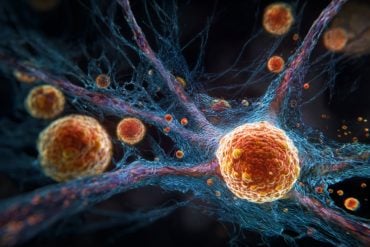Summary: Adolescents and adults whose mothers experienced depression, either during pregnancy or shortly after, had a 70% increased risk of being diagnosed with depression.
Source: UT Health
Depression in mothers during and after pregnancy increased the odds of depression in offspring during adolescence and adulthood by 70%, according to a new study by researchers at The University of Texas Health Science Center at Houston (UTHealth).
The systematic review was recently published in JAMA Network Open. It is the first study to examine the effects of maternal depression on children age 12 and older.
The authors note that 10-20% of mothers experience perinatal depression, which refers to the time during pregnancy (antenatal) or within the first year after birth (postnatal). Perinatal depression has been associated with reduced growth rates, malnutrition, and an increased risk of childhood health problems and obesity.
“There are a lot of studies that look at how perinatal depression affects a child’s growth or emotional well-being, but we wanted to look at how it affects offspring later in life,” said Vaishali Tirumalaraju, MBBS, a resident with the Louis A. Faillace, MD, Department of Psychiatry and Behavioral Sciences at McGovern Medical School at UTHealth and one of the study’s first authors.
Researchers examined all published studies on the topic, zeroing in on six major cohorts following long-term symptoms in more than 15,000 children age 12 or older.
“We found that the offspring of mothers who had perinatal depression, especially antenatal depression, had a greater chance of having depression when they grow up,” said Sudhakar Selvaraj, MD, Ph.D., an assistant professor of psychiatry with McGovern Medical School, the director of the Depression Research Program, and the study’s senior author. “This is important because it shows perinatal depression not only negatively affects the mother, but also has a lasting negative impact on the child.”
This research comes during a time of increased stress and strain on mental health, as the COVID-19 pandemic poses challenges for new and expecting mothers.
“Pregnancies during these times are particularly stressful given the social situation and physical distancing guidelines in place. There are a lot of moms without support who have to isolate, and many are handling extra stressors with limited resources,” Tirumalaraju said.

“Stress can cause changes in eating habits, less desire to exercise, and overall less healthy behaviors that can lead to depression,” said Selvaraj, a psychiatrist with UT Physicians, the clinical practice of McGovern Medical School. “Due to stigma, depression is hard to track because often mothers don’t want to report that they are sad or having trouble mentally. Our study shows the potential long-term impact of depression in offspring and therefore the need for proper screening so that moms who could benefit from counseling and/or medication can be provided the resources they need.”
Selvaraj is part of the UTHealth Women’s Mental Health Program, which provides access to specialists in psychology and psychiatry in certain UT Physicians Women’s Centers, simplifying the process for women to seek help for perinatal depression and other mental health conditions.
Study authors say more research into the factors involved in depression risk transmission and assessments of how to reduce this risk could help develop future strategies to mitigate depressive disorders in pregnancy.
About this depression research article
Source:
UT Health
Media Contacts:
Amy Laukka – UT Health
Image Source:
The image is in the public domain.
Original Research: Closed access
“Risk of Depression in the Adolescent and Adult Offspring of Mothers With Perinatal Depression”. by Vaishali Tirumalaraju et al. Sandroff et al. JAMA Network Open.
Abstract
Risk of Depression in the Adolescent and Adult Offspring of Mothers With Perinatal Depression
Importance
Maternal depression during pregnancy is associated with emotional and behavioral difficulties of offspring during childhood that can increase the risk of depression in adolescence and adulthood.
Objective
To investigate the association between perinatal maternal depression and an increased long-term risk of depression in their adolescent and adult offspring.
Data Sources
A systematic search of the electronic databases of PubMed and PsycINFO was conducted from May 2019 to June 2019.
Study Selection
A total of 6309 articles were identified, of which 88 articles were extracted for full-text review by 2 reviewers. Only articles reporting data from prospective longitudinal studies that assessed maternal depression during antenatal and/or postnatal periods and resulting offspring 12 years or older with measures of established psychometric properties were included. Exclusion criteria consisted of all other study designs, mothers with other medical and psychiatric comorbidities, and offspring younger than 12 years.
Data Extraction and Synthesis
Data were extracted by 2 independent reviewers, and discrepancies were mediated by an expert third reviewer. Meta-analysis was performed using Bayesian statistical inference and reported using Meta-analysis of Observational Studies in Epidemiology (MOOSE) guideline. The association of depression timing with the sex of offspring was explored using metaregression.
Main Outcomes and Measures
Offspring depression was evaluated using standardized depression scales or clinical interviews.
Results
Six studies with a total of 15 584 mother-child dyads were included in the meta-analysis, which found the offspring of mothers who experienced perinatal depression to have increased odds of depression (odds ratio [OR], 1.70; 95% credible interval [CrI], 1.60-2.65; posterior probability [PP] [OR >1], 98.6%). Although metaregression found no evidence for an overall association between perinatal depression timing and offspring depression (antenatal vs postnatal, PP [OR >1] = 53.8%), subgroup analyses showed slightly higher pooled odds for the antenatal studies (OR, 1.78; 95% CrI, 0.93-3.33; PP [OR >1] = 96.2%) than for the postnatal studies (OR, 1.66; 95% CrI, 0.65-3.84; PP [OR >1] = 88.0%). Female adolescent offspring recorded higher rates of depression in metaregression analyses, such that a 1% increase in the percentage of female (relative to male) offspring was associated with a 6% increase in the odds of offspring depression (OR, 1.06; 95% CrI, 0.99-1.14; τ2 = 0.31).
Conclusions and Relevance
In this study, maternal perinatal depression, especially antenatal depression, was associated with the risk of depression in adolescence and adulthood. More research into the mechanisms of depression risk transmission and assessments of postinterventional risk reduction could aid in the development of future strategies to tackle depressive disorders in pregnancy.






